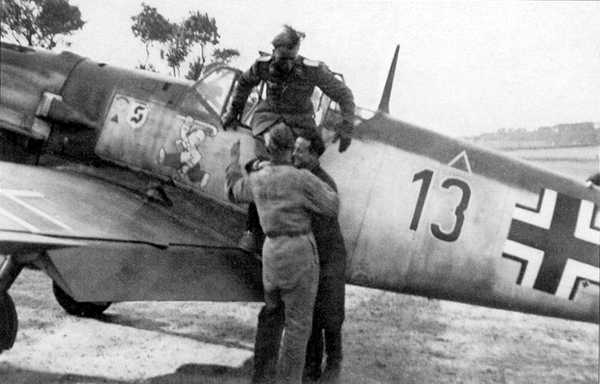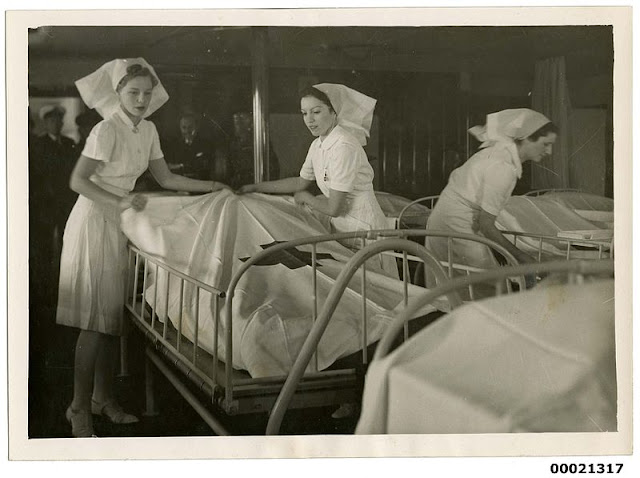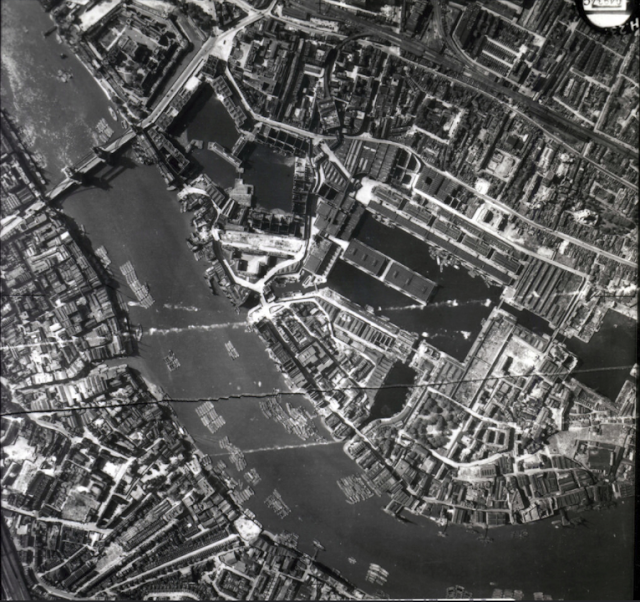Friday 11 July 1941
 |
| A Messerschmitt Bf 108 Taifun that crashed within the Reich province of Bohemia and Moravia (Czechoslovakia) on 11 July 1941. |
Despite the spectacular successes of the past few weeks, Hitler, who has too much free time on his hands at Rastenburg, is worried. Field Marshal Keitel telephones General Halder, operations boss at OKH, at noon and lists Hitler's concerns:
- Some following units are closing up too slowly on the most advanced units;
- The south flank of Army Group North and north flank of Army Group Center are not cooperating together properly, as Hitler thinks that von Bock's troops to the south are not sufficiently helping von Leeb's troops to the north;
- General Hoepner's 4th Panzer Group is "losing contact" with following infantry because it is moving too quickly.
In the Far North, the Finnish offensive in Karelia toward the Svir River that began on 10 July continues. The Finns are pounding against strong Soviet defenses on the eastern shore of the Jänisjärvi Lake north of Lake Ladoga. Aggressive offensive operations are not a Finnish strength, they are better suited to defensive operations, but they continue attacking in order to open the way south.
Further north in the Salla area, the Finnish 3rd Division of III Corps continues beating against Soviet positions on the Vyonitsa River. Elsewhere, the front is stable today, and the Germans ask the Finns to send reinforcements to get their offensives rolling again. The Finns agree to send Infantry Regiment 14.
In the Army Group North sector, the Soviets launch counterattacks against General Hoepner's 4th Panzer Group, but without much effect. The German Army Group is preparing for an advance to the southeast of Leningrad to isolate it. The Soviets are using Nevel as a "straggler collection point" that is setting up divisions to be sent back to the front.
In the Army Group Center, General Guderian's Panzer Group 2 is across the Dnepr and attacking along two axes. General Hoth's Panzer Group 3 is hit by Soviet counterattacks from the southeast and stopped. Hoth's advance units on the south are on the Orsha-Vitebsk highway.
 |
| German troops of Panzer Group 1 secure the road from Kyiv to Odesa, 11 July 1941. |
The Germans are keeping a close eye on the Soviet commanders. General Halder notes in his war diary that the commander of Soviet Northwest Front (opposing Army Group North) is Voroshilov, that of Western Front is Marshal Timoshenko, and of Southwest Front, Budenny (Budyonny). Overall, Halder is pleased with the day's fighting, noting that "The bulk of the enemy forces apparently is being taken back to the east."
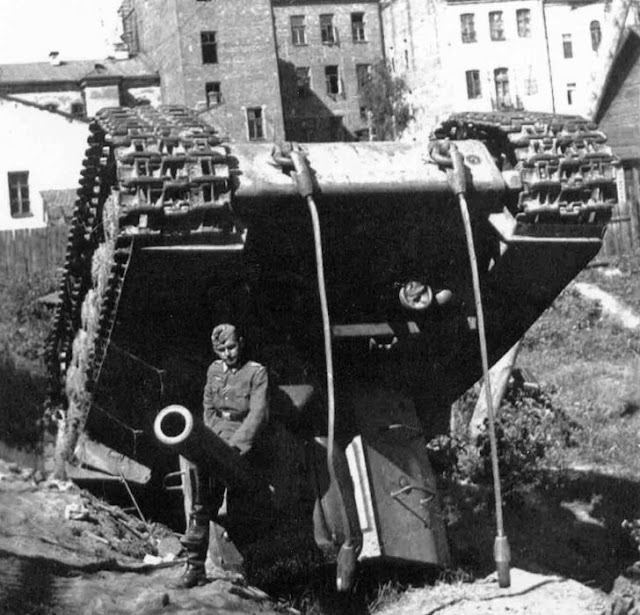 |
| Inverted and destroyed heavy tank KV-2, belonging to the Soviet 14th Tank Division of the 7th Mechanized Corps of the Red Army. The city of Vitebsk, July 11, 1941. |
Overhead, a Vichy French Dewoitine D.520 fighter shoots down a Curtiss P-40 Tomahawk - the only Tomahawk shot down during the entire campaign. Offshore, during the early morning hours, the Royal Navy sends a squadron from Haifa led by light cruisers HMS Ajax and Phoebe on a sweep along the coast looking for Vichy French shipping, but find none.
At his headquarters in Beirut, General Dentz is busy trying to arrange a ceasefire, followed by an armistice. He reaches an agreement for a ceasefire against the wishes of the Petain regime in France. The terms officially are to go into effect at one minute past midnight on 12 July, but in reality, the fighting is over around 21:00.
 |
| The Bf-109F of II/JG 51 Luftwaffe Gruppenkommandeur Josef Fözö, 11 July 1941. |
The RAF conducts Circus missions to Lille and Yainville, and a Rhubarb mission to Norrent-Fontes.
After dark, RAF Bomber Command sends 36 Hampdens to attack Wilhelmshaven. The bombs damage a fishing boat and destroy a barrack hut, killing two people.
Josef “Joschko” Fözö, Gruppenkommandeur of II/JG 51 in Russia, claims his 24th victory today. However, later in the day, he crashes on take-off at Stava Bychow and is hospitalized. Fözö is out of action until 3 May 1942.
 |
| Josef “Joschko” Fözö, injured on 11 July 1941. |
Finnish submarine Iko-Tursu lays mines.
Battle of the Atlantic: British 215-ton fishing trawler FV Suzette runs aground in thick fog and is wrecked on Girdle Reef, Peterhead.
The RAF bombs and sinks German 2575-ton transport SS Delos/Donau of the Hamburg America Line off Tobruk.
British 246-ton freighter River Trent hits a mine and is damaged north of Sheringham. It is taken under tow to Great Yarmouth.
Convoy OB-345 departs from Liverpool bound for Halifax, Convoy HX-138 departs from Halifax bound for Liverpool.
Royal Navy minesweeper HMS Felixstowe is commissioned.
Canadian corvette HMCS Algoma (Lt. John Harding) is commissioned.
German S-Boat DKM S-49 is commissioned.
 |
| HMS Defender sinking in the Mediterranean, 11 July 1941. |
After dark, the Luftwaffe raids Port Said and Ismailia with 52 bombers.
In Malta, the Italians conduct a fierce fighter attack that begins at 13:21. The Macchi 200 fighters strafe Luqa Airfield and destroy a Wellington bomber, damage four Wellingtons, and damage two Marylands. Hawker Hurricanes of RAF No. 185 Squadron intercept the Italian planes and while chasing them north, shooting down three Italian fighters and damaging four others.
Battle of the Black Sea: Soviet gunboats BKA-111 and BKA-134 advance into the Danube Estuary. Romanian coastal artillery opens fire and sinks them. Soviet gunboats No. 103 and No. 501 also are lost today, perhaps in this same action.
 |
| Under the supervision of German troops, women are inducted into the Labor Service in Riga, 11 July 1941 (Stupid, Federal Archives, Bild 146-1994-090-06A). |
In his capacity as Coordinator, Mr. Donovan will collect and assemble information and data bearing on national security from the various departments and agencies of the Government and will analyze and collate such materials for the use of the President and such other officials as the President may designate.President Roosevelt adds to his appropriations request of 10 July for $4.7 billion with an additional request for $3.3 billion for the US Navy. These are all unheard-of sums, particularly stacked one upon the other, but Congress is firmly behind the war effort (with some notable isolationist exceptions).
 |
| CA-34 USS Astoria at Mare Island Navy Yard on July 11, 1941. |
After destruction of the Soviet Armed Forces, Germany and Italy will be military masters of the European Continent, with the temporary exception of the Iberian Peninsula. No serious threat to Europe by land will then remain.The lengthy directive instructs the Commanders-in-Chief of the different services to "begin the planning and organization" of a list of things to be done once the Soviet Union is defeated. The most salient point in the directive and the only one that comes close to having any impact is Hitler's order that:
The main efforts of the armaments industry can be diverted to the Navy and Air Force.The directive contemplates a renewed prosecution of the "peripheral strategy" against Great Britain in the Mediterranean. Hitler only gives passing reference to England, noting only that tighter ties with France will further isolate London and that:
In addition to these contemplated operations against the British position in the Mediterranean, the 'Siege of England' must be resumed with the utmost intensity by the Navy and Air Force after the conclusion of the campaign in the East.Preparations for an invasion of England will continue in the hopes of tying down English forces at home (and thus not in the vital Mediterranean battleground) and "and of bringing about a final English collapse through a landing in England."
The directive also offhandedly contemplates "a German operation from Bulgaria through Turkey" to advance toward the Suez Canal, and "Exploitation of the Arab Freedom Movement." Hitler also has plans for Iran, Afghanistan, and India, which he previously offered to Stalin in exchange for joining his war.
Finnish Military: Julius Johannes Björklund is appointed the first Field Bishop (kenttäpiispa) for the Finnish Army. He is a member of the Board of Directors of the Church of Finland.
British Military: General Archibald Wavell takes up his new command in India.
 |
| 17-year-old Jeanne Cline won the Women's Western Golf Association junior championship at St. Charles (IL) Country Club on July 11, 1941. |
US Government: Robert Jackson is sworn in as a new Associate Justice of the Supreme Court of the United States.
Holocaust: The Germans, who took Vitebsk on 10 July, begin creating the Vitebsk Ghetto. The Germans will incarcerate 16,000 Jews in the ghetto, which will be notorious for its poor conditions.
It is the first day of executions at Ponary, Lithuania. A resident, Kazimierz Sakowicz, writes in his diary that he hears shots from a nearby forest where Jews have been taken, and that "the shots last an hour or two." He puts the number of Jews at 200.
 |
| Autographed promotional shot from Three Stooges comedy "I'll Never Heil Again," released on 11 July 1941. |
Columbia Pictures releases "I'll Never Heil Again," starring the Three Stooges. A short, "I'll Never Heil Again" follows the trio as they attempt to take over Europe along with their "Axel" partners. The film is notable because it is the first sequel to another film in the Three Stooges canon, and also because the Stooges break the fourth wall and directly address the audience.
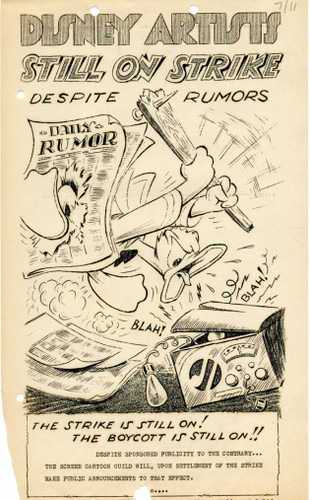 |
| A flier from the continuing strike at Disney Studios, 11 July 1941. |
July 1941
July 1, 1941: US TV Broadcasting Starts
July 2, 1941: MAUD Report
July 3, 1941: Stalin Speaks
July 4, 1941: Pogroms in Eastern Europe
July 5, 1941: Germans on Schedule
July 6, 1941: Australians Attack Damour
July 7, 1941: US Marines in Iceland
July 8, 1941: Flying Fortresses In Action
July 9, 1941: British Take Damour
July 10, 1941: Sword and Scabbard Order
July 11, 1941: Cease-fire in Syria and Lebanon
July 12, 1941: Anglo/Russian Assistance Pact
July 13, 1941: Uprising in Montenegro
July 14, 1941: Katyusha Rocket Launchers in Action
July 15, 1941: Smolensk Falls
July 16, 1941: Stalin's Son Captured
July 17, 1941: Heydrich Orders Mass Executions
July 18, 1941: Twin Pimples Raid
July 19, 1941: V for Victory
July 20, 1941: The Man Who Wouldn't Shoot
July 21, 1941: Moscow in Flames
July 22, 1941: Soviet Generals Executed
July 23, 1941: Secret Plan JB 355
July 24, 1941: Operation Sunrise
July 25, 1941: US Naval Alert
July 26, 1941: Italian E-Boat Attack on Malta
July 27, 1941: MacArthur Returns
July 28, 1941: Auschwitz Exterminations
July 29, 1941: Rescue From Crete
July 30, 1941: Raid on Petsamo and Kirkenes
July 31, 1941: Final Solution Order
2020





